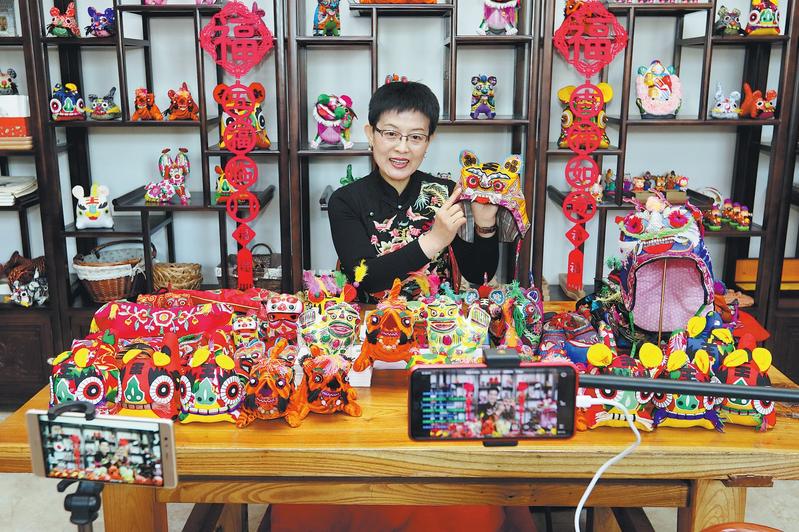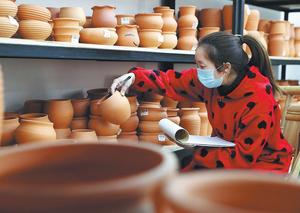Traditional-art workshops resume production and alleviate poverty, Yang Feiyue reports.
 A member from Jiaodong Folk Art Museum in Shandong province's Yantai holds an online training about making tiger-shaped hats, a local handicraft. (PHOTO PROVIDED TO CHINA DAILY)
A member from Jiaodong Folk Art Museum in Shandong province's Yantai holds an online training about making tiger-shaped hats, a local handicraft. (PHOTO PROVIDED TO CHINA DAILY)
The women's feet bobbed on the pedals of the sewing machines at the Jinpan Embroidery Workshop in Qinghai province's Huzhu Tu autonomous county in Haidong city in early April.
They were making complex traditional local embroidery, featuring bright colors and distinctive patterns.
In mid-March, the workshop resumed making local Qing embroidery, which was named as a national-level intangible cultural heritage in 2016.
Embroidery skills have opened a door to wealth for us
Xi Jinhua, employee with Sulonggu Embroidery Co in Qinghai
It has long been one of China's most influential ethnic art forms and represents Tibetan farming culture.
And Qing embroidery has found interest in such countries as the United States, France and Japan.
It has played an important role in the county's poverty alleviation.
Mothers have passed the traditional skill to their daughters for generations over centuries.
Jinpan has received more than 2,000 orders since business resumed. About 300 ethnic Tu women are producing the items.
All of Qinghai's Qing embroidery businesses have reopened since late March, the provincial culture and tourism department says.
The sector employs over 3,000 low-income locals.
Xi Jinhua has earned more than 8,000 yuan (US$1,140) over the past two months. She works for Sulonggu Embroidery Co, another workshop in Qinghai.
"Embroidery skills have opened a door to wealth for us," the 50-year-old says.
She earned over 40,000 yuan embroidering last year.
Sulonggu Embroidery general manager Su Xiaoli says: "We didn't stop production during the epidemic."
Su's company had local women make products at home during the outbreak.
It has since received over 20,000 orders from Singapore and South Korea. Embroidered goods, including facemasks, sachets and costumes, remain in demand.
Many intangible cultural heritage workshops across the country have resumed work and helped people living in poverty increase their incomes amid the epidemic.
The Ministry of Culture and Tourism and the State Council Leading Group Office of Poverty Alleviation and Development recently issued guidelines that support the founding of such workshops to create job opportunities and teach traditional art skills to people who are overcoming poverty.
The country hosts 2,300 heritage workshops that provide more than 460,000 jobs, the Ministry of Culture and Tourism says.
Many have resumed operation.
Over 30 workers have been hammering iron into broadswords in Linxia Hui autonomous prefecture in northwestern China's Gansu province.
"Most of our employees live in relatively tough circumstances," fifth-generation Bonan broadsword blacksmith Magazhuma tells China Tourism News.
Bonan swords, named after the eponymous ethnic group, were once commonplace weapons throughout China.
They're today considered works of craftsmanship, if not art.
 An employee from a Longyao clay pottery workshop in Pengzhou, Sichuan province, checks the items. The heritage workshop resumed production in March. (PHOTO PROVIDED TO CHINA DAILY)
An employee from a Longyao clay pottery workshop in Pengzhou, Sichuan province, checks the items. The heritage workshop resumed production in March. (PHOTO PROVIDED TO CHINA DAILY)
The forging process was listed as a form of national intangible cultural heritage in 2006.
It requires dozens of procedures and extraordinary craftsmanship to beat 20-millimeter steel bars into 2-mm blades over fire.
Magazhuma has innovated on traditions and developed a spider pattern in 2009. The local government has also helped to popularize the distinctive weapon and carry on the traditional trade.
The local variety has been gaining popularity and selling well in Mongolia and Saudi Arabia via e-commerce.
Magazhuma's workshop takes every employee's temperature and sanitizes its spaces daily.
"The production resumption will allow the workshop to generate income and pay employees," he says.
Magazhuma plans to advance technical upgrades and improve design to increase competitiveness.
Intangible cultural heritage workshops have also used the internet to boost business during the epidemic.
In Central China's Hunan province, Shi Jia has increased sales by using livestreams to market ethnic Miao embroidery on the major online-shopping platform Taobao since early March.
Shi runs a workshop that produces Miao embroidery, which the State Council named as a form of national intangible cultural heritage in 2006.
Online promotion has helped her business get back on track.
Shi's employees displayed their skills and the embroidering process in the videos.
"Every broadcast has gotten about 20,000 views, which I'm happy with," Shi tells China Tourism News.
She plans to do more livestreaming on such platforms as Douyin (known as TikTok overseas) to popularize the traditional art.
In the Inner Mongolia autonomous region, Arxan Forest Culture Industry Development Co has taught poor households how to take online orders and carve tree-bark art at home.
After local households finish a piece, the company sends personnel to collect it and pays them on the spot, manager Xie Caiyun says.
Bark pictures were named as a form of local intangible cultural heritage in 2018.
The company has continued to update, and has streamlined production and diversified products.
Its Peking Opera facial makeup, ballerina and 12 Chinese zodiac-animals series have been popular.
Gansu offered a 3.42 million yuan subsidy to 510 provincial and national intangible cultural heritage inheritors in early March.
The goal is to encourage them to create more works and guide households living in poverty to produce art, the province's culture and tourism department says.
Hunan is working to set up offices to upgrade traditional crafts' designs and invite experts to give guidance to the sector.
Shops selling cultural products will also be developed in the province's capital, Changsha.
Hebei province's intangible cultural heritage inheritors have been undergoing online training.
Over 80 apprentices have joined more than 30 sessions, says Zhang Yanling, deputy director of the tourism, culture, radio and TV department of Hebei's Fengning Manchu autonomous county.
The county's government will continue to organize online trainings to help locals increase their incomes and to introduce e-commerce to expand sale channels.
And research teams will be formed to upgrade traditional-art products and make them more competitive, Fengning county's government says.
Contact the writer at yangfeiyue@chinadaily.com.cn


